 Petzlover
Petzlover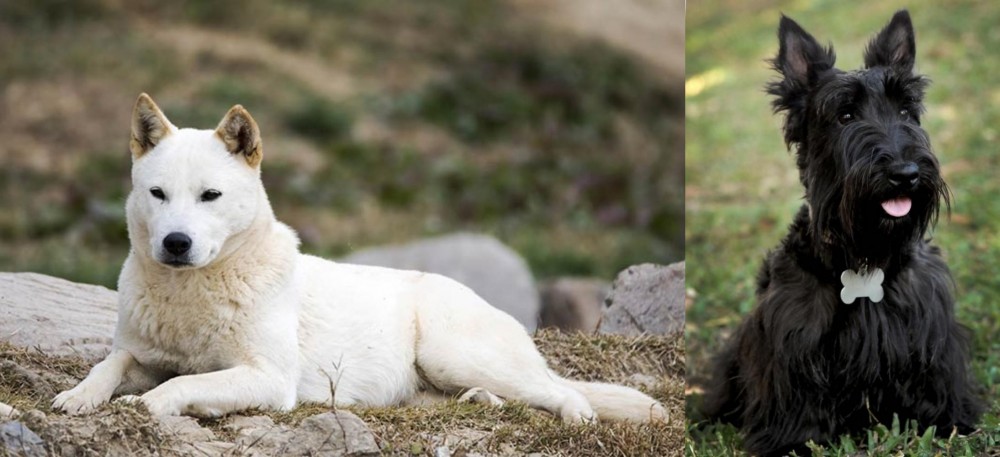 Jindo is originated from South Korea but Scoland Terrier is originated from United Kingdom. Jindo may grow 38 cm / 15 inches higher than Scoland Terrier. Jindo may weigh 13 kg / 29 pounds more than Scoland Terrier. Both Jindo and Scoland Terrier has almost same life span. Both Jindo and Scoland Terrier has same litter size. Jindo requires Moderate Maintenance. But Scoland Terrier requires High Maintenance
Jindo is originated from South Korea but Scoland Terrier is originated from United Kingdom. Jindo may grow 38 cm / 15 inches higher than Scoland Terrier. Jindo may weigh 13 kg / 29 pounds more than Scoland Terrier. Both Jindo and Scoland Terrier has almost same life span. Both Jindo and Scoland Terrier has same litter size. Jindo requires Moderate Maintenance. But Scoland Terrier requires High Maintenance
 Hailing from Korea, the Jindo dog's name is actually taken from the island Jindo. The dogs lived on the island for thousands of years, developing into a natural breed with good hunting skills.
Hailing from Korea, the Jindo dog's name is actually taken from the island Jindo. The dogs lived on the island for thousands of years, developing into a natural breed with good hunting skills.
They are also known as Jin Dog, Jindo-kae or Jindo-kyon. The exact origins of the Korean Jindo are unknown and it is believed to have been developed from different Mongolian breeds.
They were brought to the United States and been entered into the American Kennel Club.
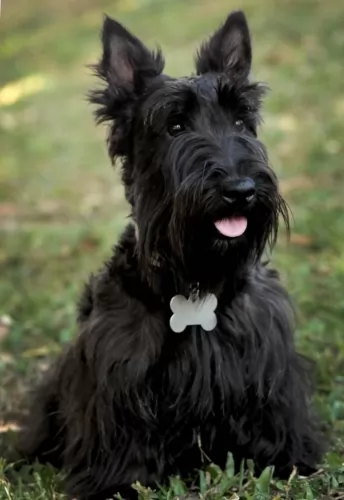 Not much is known about the Scoland Terrier. It is not a purebred but rather a crossbreed developed by crossing the Scottish Terrier with the Westland Terrier. To understand these mixed breeds, look to the original breeds for any combination of the characteristics of the breeds. The offspring of this crossing is not a 50-50 split of the original breeds looks or temperament.
Not much is known about the Scoland Terrier. It is not a purebred but rather a crossbreed developed by crossing the Scottish Terrier with the Westland Terrier. To understand these mixed breeds, look to the original breeds for any combination of the characteristics of the breeds. The offspring of this crossing is not a 50-50 split of the original breeds looks or temperament.
Because the Scoland Terrier is a mix between the Scottie and the Westie he has all the characteristics of a typical terrier perhaps even twice as much. With both parents being terriers, you can expect your Scoland to act like a short legged terrier. These dogs are known for their courage and tenacity. Today these terriers are family companions. Most terriers today come from a pool of ancestral dog in the 19th century in Europe. This information was gleaned from a genetic analysis done in 2006.
The Scoland Terrier, being a hybrid, is not acknowledged by the American Kennel Club (AKC) or the United Kennel Club (UKC). It is acknowledged by the International Designer Canine Registry (IDCR), American Canine Hybrid Club (ACHC), Dog Registry of America, Inc. (DRA), Designer Dogs Kennel Club (DDKC) and Designer Breed Registry (DBR).
 The Jindo is a medium sized spitz-type dog breed which is well-proportioned with erect ears and a long tail which is held over the dog's back.
The Jindo is a medium sized spitz-type dog breed which is well-proportioned with erect ears and a long tail which is held over the dog's back.
He stands at roughly 45 – 65cm and they weigh anything between 11 to 23kg. The coat of the dog is medium length and available in a number of colors – yellow, tan, red, white, brindle, black or bi-color such as black and tan.
When you look at the Jindo you get the impression of bright alertness and intelligence. He makes a great watchdog, and with his bright, alert eyes and upright ears, he just looks like he is on guard.
The Jindo has always been a hunting dog so he has learned to be bold, tenacious and alert. He is also brave, courageous, loving and loyal to his master, but you need to know that he is a dominant dog who will get on well with an owner who is fair, strong, patient, kind and firm.
These dogs are strong willed, independent and dominant as well as being intelligent. He will require socialization and training from an early age. Be fair, firm and consistent with your instructions which he will obey once he has been trained. With training he gets on well with children in the home but he is inclined to have some difficulty with accepting other dogs into the family.
As with any dog breed, the temperament of the Jindo will vary according to the environment he lives in and the type of owners he has. The typical Jindo is an affectionate dog with his human family, being a little bit reserved around strangers.
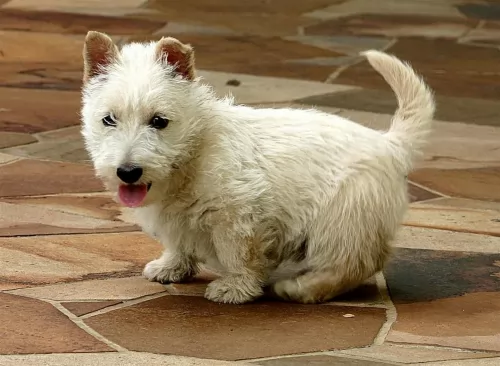 Being a hybrid, the Scoland Terrier will not always look alike and could look like a Scottie, a Westie or a combination of the two. Most breeders of this designer dog say it usually has a body like the Scottie and a round head like the Westie. They are more often black with white markings, but they can often be wheaten as well. With round dark eyes, a scissors bite and black nose, her face is unique. The breed has erect and small, triangular ears and a medium fluffy tale. The coat is hard and wiry, with a dense soft undercoat.
Being a hybrid, the Scoland Terrier will not always look alike and could look like a Scottie, a Westie or a combination of the two. Most breeders of this designer dog say it usually has a body like the Scottie and a round head like the Westie. They are more often black with white markings, but they can often be wheaten as well. With round dark eyes, a scissors bite and black nose, her face is unique. The breed has erect and small, triangular ears and a medium fluffy tale. The coat is hard and wiry, with a dense soft undercoat.
 The Jindo makes an awesome pet for owners who enjoy an active lifestyle. A happy, contented Jindo becomes a devoted, loyal pet who wants to guard and protect his owner from strangers, for whom he is wary and reserved.
The Jindo makes an awesome pet for owners who enjoy an active lifestyle. A happy, contented Jindo becomes a devoted, loyal pet who wants to guard and protect his owner from strangers, for whom he is wary and reserved.
He is an intelligent pet too, being easy to train and socialize and while independent, he loves to spend time with his human family and is an all-round excellent pet.
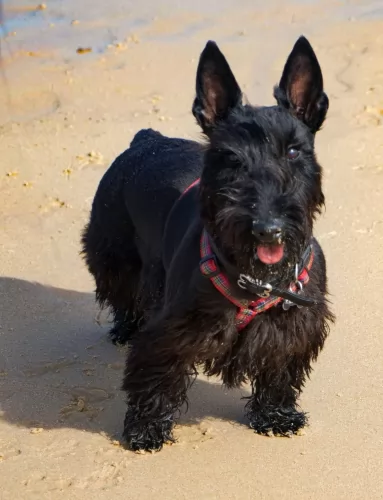 1.Children friendliness - they can be very good with children and children can help them get their exercise.
1.Children friendliness - they can be very good with children and children can help them get their exercise.
3.Adaptability - yes but she is adept at digging and must have a safe enclosure.
 The Korean Jindo dog is looked upon as a generally healthy dog breed with no serious genetic problems to talk about. Look out for eye diseases and dental decay as well as hypothyroidism, a common disease in dogs where you notice deterioration with the coat – thinning, dry and dull.
The Korean Jindo dog is looked upon as a generally healthy dog breed with no serious genetic problems to talk about. Look out for eye diseases and dental decay as well as hypothyroidism, a common disease in dogs where you notice deterioration with the coat – thinning, dry and dull.
The dog’s skin also becomes flaky and you’ll notice that your once energetic pet is now gaining weight and is lethargic. Get him to the vet. Hypothyroidism can be treated simply by your vet to get your pet healthy once again.
 This hybrid dog can inherit any of the issues faced by its two parent breeds. For the Scoland Terrier this can include:
This hybrid dog can inherit any of the issues faced by its two parent breeds. For the Scoland Terrier this can include:
• Seborrhea – Skin disease that can cause dogs to scratch until bleeding and/or infected.
• Carniomandibular Osteopathy -called lion’s jaw this is a developmental disease that causes extensive changes in the bones of the mandible and skull.
• Pulmonic Stenosis – when the blood flowing from the heart’s right ventricul to the pulmonary artery is blocked.
• PPM or Persistent Pupillary Membranes - causes visual impairment when the membranes do not dissolve after birth.
• Chronic Hepatitis – disease of the liver that can eventually cause major damage.
 The Jindo has a double coat and this sheds heavily about twice a year, so certainly during these shedding periods you will need to brush his coat twice a week to keep it free from loose hair.
The Jindo has a double coat and this sheds heavily about twice a year, so certainly during these shedding periods you will need to brush his coat twice a week to keep it free from loose hair.
Never just assume that your dog is healthy and happy. When you brush him, check him over for ticks and fleas, check him for any unusual lumps, make sure his nose is wet and that his eyes are bright. Look at the condition of his fur, check his teeth and inside his ears – there are lots of tell-tale signs that can indicate that all is not well with your pet and then you need to get him to the vet.
As a medium-sized breed, if you feed your dog commercially manufactured food, he will require a high quality food that has been formulated for a dog of his size and his activity levels. Mix some home-made cooked chicken, brown rice or pasta as well as vegetables into his kibble and try to include some raw meat in occasionally too. He needs to always have access to fresh, clean water.
The Jindo is a high energy dog, and with his bright face you can tell that he is always ready for action. Long ago he was bred to perform hunting and retrieving type jobs, and with their stamina, they require having a busy day.
They certainly require a significant amount of exercise and mental stimulation, so you will need to include him in your daily walks and give him exciting ball games.
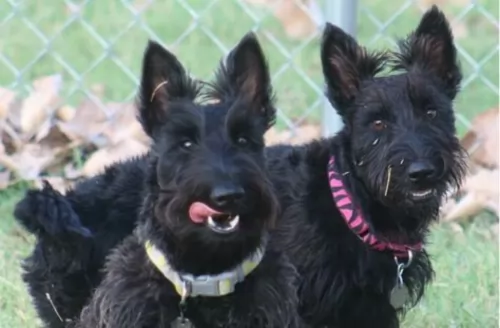 1.Feeding the puppy - Give a high quality puppy dog food designed for terriers or active medium sized dogs. Give ¾ of a cup over 3 meals a day.
1.Feeding the puppy - Give a high quality puppy dog food designed for terriers or active medium sized dogs. Give ¾ of a cup over 3 meals a day.
2.Feeding the adult – Give a high quality adult dog food designed for terriers or active medium sized dogs. Give one cup over two meals a day.
4. Games and Exercises – The Scoland Terrier is a very active dog and needs daily exercise, He need time to play, run, and be stimulated by games. She would be very good at flyball, Frisbee, fetch, agility, barn hunt, and obedience. He needs at least 2 hours of play and exercise everyday.